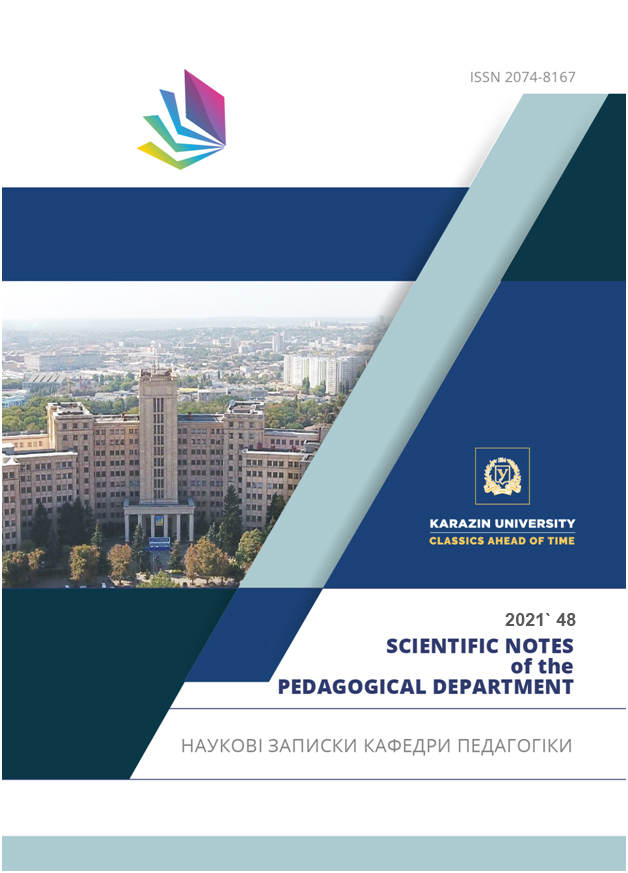Motivation as a necessary factor in the organization of non-linguistic students’ scientific work
Abstract
Students’ scientific work is an integral element of the training of creative specialists, so the motivation for the implementation of this type of work is a necessary task at the modern stage of the development of education. The article presents approaches to students’ scientific work (an instructional technique with the help of which the teacher supports and manages educational activities to deepen and expand their knowledge and skills; active pedagogy, which contributes to the development of students’ research; active learning of students with an emphasis on the development of their intellectual and research skills; one of the most important means of improving the quality of training and education of future specialists, etc.). The main driving motivational factors of scientific work are identified (desire to obtain subjectively new knowledge, development of cognitive and creative abilities, desire to understand the essence of certain phenomena and reveal them to other participants of the educational process, desire for self-realization, etc.). Main types of scientific work when teaching the English language to students of the non-linguistic specialties are presented (summary and annotation in English, preparation and defence of abstracts on relevant topics, preparation of theses or articles with their subsequent publication, encouraging students to participate in scientific conferences in English). Our own experience in organizing the scientific work of students is described (defining the topic of the abstract according to the working programs of the faculties, holding conferences at the faculties and the All-Ukrainian scientific students’ conference). Scientific work of this format contributes to the formation of students' positive motivation for self-education and self-development; regular participation in scientific work develops the need for self-education, creative growth, and ability to solve problems independently.
Downloads
References
/References
«Professyonalno-oryentyrovannoe obuchenye ynostrannim yazikam Anderson, J., Priest С. (2014) Developing an Inclusive Definition, Typological Analysis and Online Resource for Live Projects’. Architecture Live Projects. Pedagogy into Practice. Р. 9–17.
Healey, Lopatto D. (2003) The Essincial Features of Undergraduate Research. Council on Undergraduate Research Quaterly. March. P. 139–142.
Hutching, W. Enquiry-based learning: definitions and rationale. Centre for Excellence in Enquiry-Based Learning Essays and Studies. URL : http:// ac.uk/ceebl/recources/papers/hitchings2007definingebl.pdf
Jenkins, A., Healey M. (2007) Developing the student as a researcher through the curriculum. Improving Student Learning through the Curriculum. Р. 6–19.
McCarthy, M, O’Dell F. (2008) Academic Vocabulary in Use. Cambridge University Press. P. 63.
Walkington, H. (2015) Students as Researchers : Supporting Undergraduate Research in the Disciplines in Higher Education. The Higher Educational Establishement. 34 p.
Honcharenko, S. U Ukrainskyi pedahohichnyi slovnyk [Ukrainian Pedagogic Dictionnary]. K. 1997. 375 р.
Zaniuk, S. S. (2002) Psykholohiia motyvatsii [Phycology of Motivation]: navch. posib. K. 304 р.
Mykytiuk, O.M. (2004) Teoriia i praktyka orhanizatsii naukovo-doslidnoi roboty u vyshchykh zakladakh osvity Ukrainy XX st. [Theory and Practice of Organization of Research Work in Higher Education Establishments of Ukraine in the XX-th century.] avtoref. dys. na zdobuttia nauk. stupenia d-ra ped. Nauk. 42 р.
Pukhno, S. (2018) Motyvatsiia do navchannia yak faktor uspishnosti adaptatsii pershokursnykiv zakladiv vyshchoi osvity [Motivation to Study as a Factor in the Success of Freshmen Adaptation in Higher Education]. Zbirnyk naukovykh prats «Problemy suchasnoi psykholohii. 1 (13). Р. 121–126.
Iarullyna, A. Sh. (2012) Osobennosty obuchenyia ynostrannomu yaziku studentov neiazikovikh spetsialnostei v pedahohycheskom Vuze [Specific Features of Teaching a Foreign Language to Students of Non-Language Specialties in the Pedagogical University]. : sb. ma-v VI nauch-pr. konf. ». Р. 159–164.
Anderson J., Priest С. Developing an Inclusive Definition, Typological Analysis and Online Resource for Live Projects’. Architecture Live Projects. Pedagogy into Practice. 2014. Р. 9–17.
Healey, Lopatto D. The Essincial Features of Undergraduate Research / David Lopatto.- Council on Undergraduate Research Quaterly. – March 2003. – P. 139–142.
Hutching W. Enquiry-based learning: definitions and rationale. Centre for Excellence in Enquiry-Based Learning Essays and Studies. URL : http:// ac.uk/ceebl/recources/papers/hitchings2007definingebl.pdf
Jenkins A., Healey M. Developing the student as a researcher through the curriculum. Improving Student Learning through the Curriculum. Oxford. Oxford Centre for Staff and Learning Development. 2007. Р. 6–19.
McCarthy M, O’Dell F. Academic Vocabulary in Use. Cambridge University Press. 2008. P. 63.
Walkington H. Students as Researchers : Supporting Undergraduate Research in the Disciplines in Higher Education. The Higher Educational Establishement, Yourk, 2015. 34 p.
Гончаренко С. У. Український педагогічний словник. К. 1997. 375 с.
Занюк С. С. Психологія мотивації : навч. посіб. К. : Либідь. 2002. 304 с.
Микитюк О. М. Теорія і практика організації науково-дослідної роботи у вищих закладах освіти України XX ст.: автореф. дис. на здобуття наук. ступеня д-ра пед. наук.К. 2004. 42 с.
Пухно С. Мотивація до навчання як фактор успішності адаптації першокурсників закладів вищої освіти. Збірник наукових праць «Проблеми сучасної психології». № 1 (13). 2018. С. 121–126.
Яруллина А. Ш. Особенности обучения иностранному языку студентов неязыковых спецыальностей в педагогическом Вузе. : сб. ма-в VI науч-пр. конф. «Профессионально-ориентированное обучение иностранным языкам». С. 159–164.

